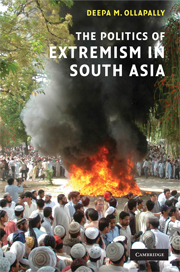Book contents
- Frontmatter
- Contents
- Acknowledgements
- Map of South Asia
- 1 Introduction: beyond and before the 9/11 framework
- 2 Situating violent conflict in South Asia
- 3 Afghanistan's changing fortunes
- 4 Pakistan at the crossroads
- 5 Conflict and contradiction in Kashmir
- 6 Sri Lanka's violent spiral
- 7 Bangladesh: divided politics and geopolitics
- 8 Conclusion
- Bibliography
- Index
7 - Bangladesh: divided politics and geopolitics
Published online by Cambridge University Press: 05 September 2012
- Frontmatter
- Contents
- Acknowledgements
- Map of South Asia
- 1 Introduction: beyond and before the 9/11 framework
- 2 Situating violent conflict in South Asia
- 3 Afghanistan's changing fortunes
- 4 Pakistan at the crossroads
- 5 Conflict and contradiction in Kashmir
- 6 Sri Lanka's violent spiral
- 7 Bangladesh: divided politics and geopolitics
- 8 Conclusion
- Bibliography
- Index
Summary
Bangladesh's short history since independence in 1971 has produced several surprises. Economically, it has defied those who dismissed its prospects from the beginning and has even been an innovator in small-scale economic development. Politically, it has moved haltingly towards a democratic framework that has been durable, if turbulent. Bangladesh's society, too, has been notable for its pluralist ethos and religious co-existence. For the most part, it has also managed to remain relatively insulated from major geopolitical upheavals that have shaken the region and beyond.
Since the elections of 2001, however, politics in Bangladesh has become unexpectedly divisive, exposing sharp polarizations on secular, religious and geopolitical identities. A critical question is whether the increasing violence in the political sphere is a reflection of these fundamental issues or, more simply, competition among parties for political spoils. The rise of Islamist extremism in the country and its implications beyond its borders suggests that we cannot ignore this question, despite the country's promising origins. In addition, as a Muslim majority country, Bangladesh has stood in some contrast to Pakistan and Afghanistan, providing us with a counter-example to developments in the region. For the purposes of this book, the focus here is on how the various identity strands in Bangladesh have interacted over time, with the country first escaping the worst forms of polarization, only to be confronted with them later. Unlike the other chapters, it is the potential for sustained violent extremism that is of concern.
- Type
- Chapter
- Information
- The Politics of Extremism in South Asia , pp. 177 - 208Publisher: Cambridge University PressPrint publication year: 2008



